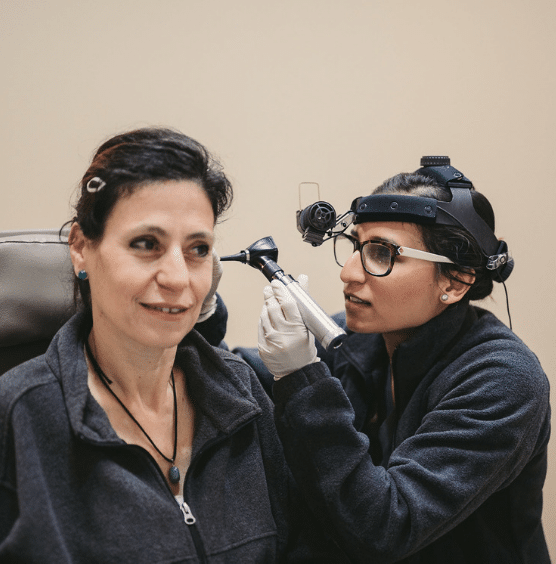
Rhinitis 101
Rhinitis is a complicated disease. It seems disarmingly simple at first glance, but it actually encompasses an entire world of types, causes, and symptoms. We’ll explore allergic rhinitis in just a moment, but first, let’s look at the different types.
Rhinitis can take many forms, including:
- Allergic Rhinitis
- Seasonal Allergic Rhinitis
- Perennial Allergic Rhinitis
- Nonallergic Rhinitis
- Viral Rhinitis
- Chronic Rhinitis
- Occupational Rhinitis
- Atrophic Rhinitis
- Vasomotor Rhinitis
- Hormonal Rhinitis
- Rhinitis Medicamentosa (RM)
Allergic rhinitis is often referred to as hay fever.
What is Allergic Rhinitis?
Allergic rhinitis is the most common type of rhinitis, and it’s what we treat here at Florida Sinus & Snoring Specialists. At its most basic, allergic rhinitis is your immune system’s response to an allergen that you breathe in. The mucous membrane in your nasal cavity becomes irritated and inflamed due to the presence of this allergen. This then leads to symptoms including congestion, sneezing, watery eyes, and more.
There are two distinct subtypes within the larger umbrella of allergic rhinitis – seasonal and perennial. Seasonal occurs, as the name suggests, in specific seasons. Maybe you’re allergic to ragweed and experience seasonal allergic rhinitis during the spring. Maybe you’re allergic to grass and experience seasonal allergic rhinitis during the summer. In both cases, you can expect an end to your symptoms once the season changes. Perennial allergic rhinitis, on the other hand, occurs regardless of the season or time of year.
The length and frequency of your symptoms also play a role in how allergic rhinitis is classified. Mild-intermittent is when you experience symptoms less than four days per week or less than four weeks in total. Mild-severe is when you experience symptoms for more than four days per week or longer than four weeks.

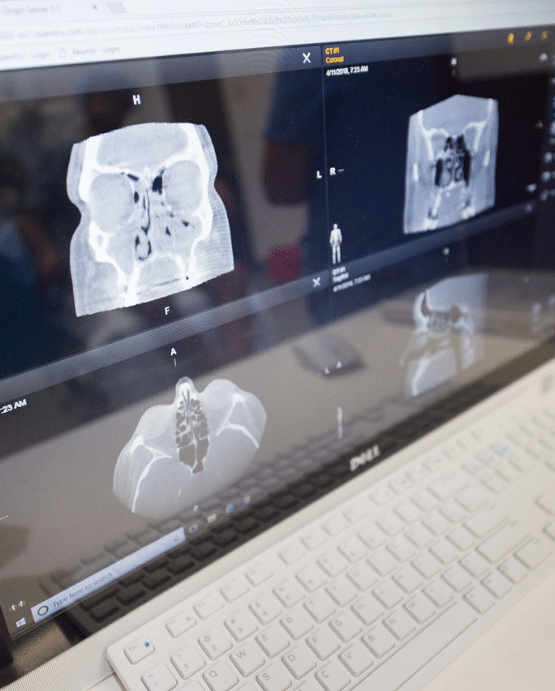
Nonallergic Rhinitis
Nonallergic rhinitis is another umbrella term for several distinct types of rhinitis. These subtypes are generally named after what causes them. Viral rhinitis, for example, is caused by a viral infection, while occupational rhinitis is caused by a specific allergen or irritant in your workplace.
Viral rhinitis is often used interchangeably with the common cold. In fact, the common cold is most often caused by something called the rhinovirus. Sound familiar? It should – it gets its name from the suffix “rhin,” which means nose.
Chronic rhinitis is a type of rhinitis that lasts for more than six weeks. It can be caused by infection, air pollutants, irritants, and even allergic rhinitis itself. Atrophic rhinitis is a form of chronic rhinitis. It’s characterized by the thinning, drying, and hardening of the mucous membrane. Vasomotor rhinitis is another form of chronic rhinitis. In this instance, it’s caused by air irritants. These can include smoke, perfumes, and even extremely spicy foods.
Hormonal rhinitis is caused by an imbalance in your body’s natural hormones. There are many triggers for this unbalance, including pregnancy, puberty, hypothyroidism, and more.
Rhinitis Medicamentosa (RM) is caused by the overuse of certain medicines, most often nasal decongestants. Sometimes called “rebound rhinitis,” it develops after an individual has used decongestants like Afrin (oxymetazoline) for an extended period.
What Causes Allergic Rhinitis?
Turning our attention back to allergic rhinitis, it’s time to find out what causes this frustrating illness. It’s caused by your immune system’s natural response to allergens, so the questions then become – what are allergens and why does your immune system attack them?
Allergens can include just about everything, but the most common are:
- Pollen
- Mold
- Animal Dander
- Dust Mites
- Latex
- Specific Types of Food
- Medications
While allergic rhinitis isn’t often caused by latex, food, or medications, it can be in very rare cases.
Your immune system reacts to these normally harmless allergens with something called an IgE (immunoglobulin E) response. This is an overproduction of IgE, which then causes your body to release histamines and leukotrienes. The result is allergic rhinitis symptoms including a stuffy nose, postnasal drip, and sneezing.
Comorbid Disorders
Allergic rhinitis is often associated with other diseases of the sinuses. This is due to the overlap in symptoms, but also the fact that rhinitis can lead to comorbidity. Common comorbid disorders include:
- Sinusitis
- Nasal Polyps
- Asthma
- Conjunctivitis
- Pharyngitis
- Laryngitis
- Snoring
- Obstructive Sleep Apnea (OSA)
- Eczema
Allergic Rhinitis Symptoms
Although your doctor or allergist is the only one who can diagnose allergic rhinitis, there are a variety of symptoms that hint at it. You may experience any of the following after coming into contact with an allergen:
- Runny Nose
- Congestion
- Sneezing
- Nasal Cavity Itchiness
- Sore or Scratchy Throat
- Coughing
- Postnasal Drip
- Watery or Itchy Eyes
- Inner Ear Pressure
- Headaches
- Decreased Sense of Smell
- Dark Circles and Puffiness Beneath the Eyes
- Fatigue
Treating Allergic Rhinitis at Florida Sinus & Snoring Specialists
Now that you know more about what rhinitis is, and how you can help minimize your symptoms at home, it’s time to look at how to get rid of allergic rhinitis once and for all. Find out how Florida Sinus & Snoring Specialists treats allergic rhinitis below. Give us a call at (954) 983-1211 today to learn more and schedule an appointment.
Diagnostic Testing
It’s essential to identify exactly what’s causing your allergic rhinitis before starting any treatment. We have two effective ways to diagnose at Florida Sinus & Snoring Specialists – diagnostic studies and allergy tests.
Diagnostic studies are a range of tests that Dr. Mandel and his team use to understand what’s causing your allergic rhinitis and determine its severity. This includes nasal endoscopy, CT scans, and sinus cultures (if needed).
A nasal endoscopy is a type of examination that uses an endoscope (thin, sometimes flexible tube with a light and camera attached to its tip) to view what’s happening in your nasal cavity. Dr. Mandel inserts the tube and is able to see the extent of inflammation in your mucous membranes. CT scans use X-ray imagining and create a cross-sectional view of your sinuses and other facial tissues. Sinus cultures involve swabbing a sample of mucus and testing it for infection.
It’s important to note that sinus cultures aren’t always needed to diagnose allergic rhinitis. In many cases, a nasal endoscopy paired with a CT scan will give Dr. Mandel more than enough information.
Allergy tests are a way to identify what you’re allergic to. While traditional allergy testing involves hundreds of tiny skin pricks, Florida Sinus & Snoring Specialists has a proprietary technique that uses fewer pricks and tests for more potential allergens. This method is a combination of skin pricks and intradermal testing. It allows us to get a more accurate picture of the type and severity of your allergies.
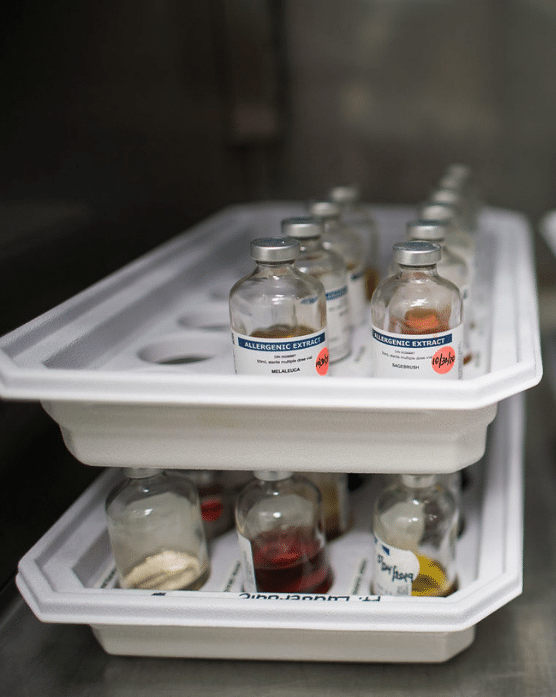
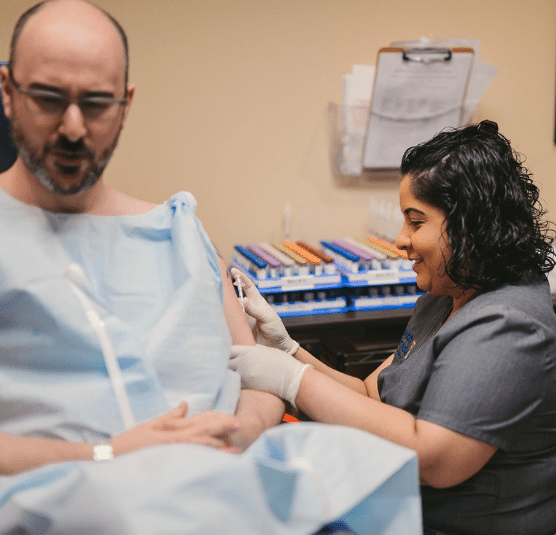
Immunotherapy
Allergy immunotherapy is a modern take on the centuries-old idea that your immune system can be “trained” not to respond to allergens. Immunotherapy works by introducing tiny amounts of allergens into your system over a period of years. Your immune system becomes used to the particular allergens and no longer produces excessive amounts of IgE or other chemicals.
Immunotherapy is broadly broken into two phases – build-up and maintenance. The build-up phase lasts between 1-2 years and involves one treatment each week. Each treatment uses a slightly larger amount of allergens. After you’ve reached an effective therapeutic dose, the maintenance phase begins. This can last between 1-2 years. You’ll receive treatments on an approximate frequency of one per month.
You can be treated for multiple allergies at once during immunotherapy.
Immunotherapy treatment most often takes the form of subcutaneous injection (SCIT or allergy shots), though it can also be delivered via oral mucosal immunotherapy (also known as OMIT).
ClariFix Cooling
ClariFix is a breakthrough in medical science. It’s the only FDA approved medical device that treats chronic nonallergic rhinitis and allergic rhinitis. As one of the only Rhinologists in South Florida, Dr. Mandel is uniquely suited to perform ClariFix Cooling treatments.
ClariFix is a type of allergic rhinitis treatment known as cryotherapy. This provides relief by freezing the posterior nasal nerve, commonly known as the “runny nose nerve.” The ClariFix balloon is inserted to the back of your nasal cavity and immediately starts working. The entire procedure takes as little as five minutes and can offer you relief from rhinitis for years to come.
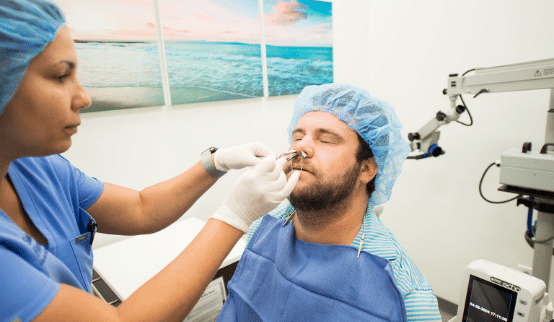
Oral Mucosal Immunotherapy (OMIT)
OMIT is a form of immunotherapy that uses a custom-formulated toothpaste to build immunity to allergens. Rather than receiving injections, Dr. Mandel will prescribe an “allergy toothpaste,” which contains small amounts of allergens.
Oral mucosal immunotherapy is uniquely effective at treating allergic rhinitis thanks to its delivery method. The mucous membranes beneath your tongue contain a high concentration of Langerhans cells (LC). These are the cells which regulate your immune system. By introducing allergens directly to Langerhans cells, your body is able to build immunity quicker than with injections.
Minimally Invasive Nasal Procedures
Minimally invasive nasal procedures are a way to treat allergic rhinitis without large incisions, cutting, or other complicated types of surgery. There are several different nasal procedures which fall under the minimally invasive umbrella. These include ClariFix Cooling and:
- Balloon Sinuplasty
- Turbinate Reduction
- Septoplasty
- And More
Ready to say goodbye to allergic rhinitis once and for all? Then call Florida Sinus & Snoring Specialists today at (954) 983-1211 to schedule an appointment with Dr. Mandel.
World-Class Care in Your Backyard
Now that you know more about allergic rhinitis and some of the ways we treat it at Florida Sinus & Snoring Specialists, it’s time to explore how we’re redefining sinonasal care.
Our team of experts is led by Dr. Mandel, a double Board-Certified leader in the fields of otolaryngology and rhinology. He’s recognized the world over for his innovative developments in the treatment of all sorts of sinus, allergy, snoring, and sleep issues.
Perhaps more importantly, Dr. Mandel has helped thousands of patients breathe easier. He’s built a reputation for the highest level of patient-focused care. Part of this is the individualized treatment plans that each of our patients receive. No two patients’ symptoms and complaints are the same, therefore each treatment plan is customized to fit the needs of the patient.
We have two state-of-the-art facilities in South Florida. Located conveniently in Plantation and Fort Lauderdale, Florida Sinus & Snoring Specialists is bringing world-class care into your backyard. Our surgical suites are Level III state-certified.
Call us today at (954) 983-1211 or request an allergic rhinitis consultation appointment online!
